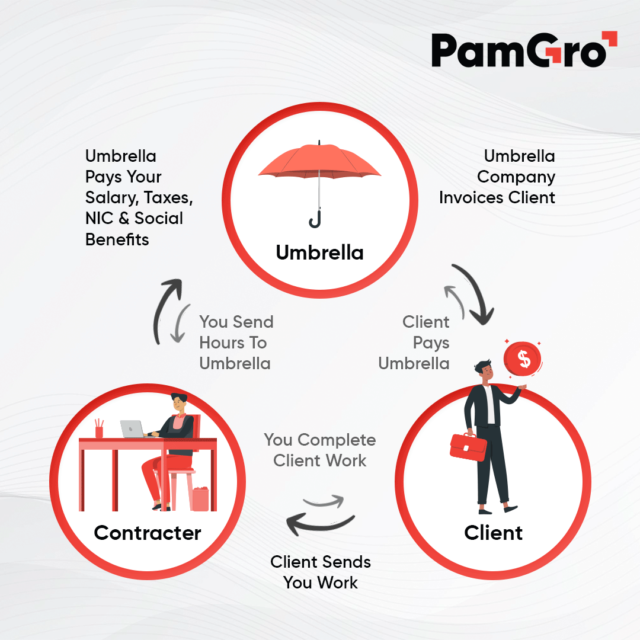The past decade has paved the way for today’s world, which is more connected than ever. This has made contract work much more approachable, where freelancers and independent professionals can collaborate with clients from various parts of the geography.
However, when crossing borders, there are multiple hurdles, which include but are not limited to compliance, payroll income tax, and legal procedures. There’s a valuable ally that simplifies the journey for both contractors and clients alike. These companies are called umbrella companies, the unsung heroes of the contracting landscape.
What is an Umbrella Company?
An umbrella firm is typically used by recruiting agencies to pay temporary employees. In many situations an umbrella company hires you and pays wages via payroll. There are no permanent jobs for them, they have been recruited and staffed through a recruitment agency (a business in employment).
Picture a scenario where the burdensome administrative and financial aspects are expertly handled, allowing contractors to focus solely on their craft.
An umbrella company is most suited for individuals who are working as contractors, for recruitment agencies, companies, and clients expanding globally.
In this blog, we’re about to delve into the world of umbrella companies and unveil their pivotal role in streamlining the lives of independent contractors.
How do Umbrella Companies operate?

As previously stated Umbrella companies operate by acting as an intermediary between the contractor and the end client. When a contractor secures a temporary project, they will sign a contract with an umbrella company like PamGro, which means they now enter into an agreement with the end client or recruitment agency to run the contractor’s payroll.
Upon receiving payment, the umbrella company processes it into bank account, deducts taxes, and National Insurance contributions. The remaining amount, after deducting the umbrella company’s fee and other deductions, is paid to the contractor as their net salary. The exact fee charged by the umbrella company will depend on the terms of the contract placed between the contractor and the umbrella company.
The umbrella company offers payroll solutions similar to PAYE or Pay-As-You-Earn structure but with few key differences. The umbrella company employs candidates who work on projects for a fixed-term, and plays the intermediary between the contractors and the end client (or a recruitment company) to manage their payroll. This allows contractors to focus on their core job without having to worry about the paperwork and compliance involved in running their own limited company.
If you’re a contractor looking to calculate your net salary through an umbrella company, consider using PamGro’s Payroll Calculator.
The UK is a hotspot for umbrella companies, primarily due to the various complexities involving employment rights, compliance, and tax legislations like IR35. This law affects contractors and freelancers equally, making compliance a challenging affair. Umbrella companies in the UK offer a streamlined way to manage the complex nature of recruitment, ensuring contractors are compliant with statutory employment rights and tax laws while enjoying the benefits of the employment.
In addition to handling payroll and tax, PamGro’s entity in the UK also provides an array of employee benefits, such as holiday pay, pension schemes, and more.
Why partner with an Umbrella Company?
The primary purpose of an umbrella company is to provide a hassle-free way for contractors to manage their finances and administrative tasks to avoid the time-consuming and complex nature of setting up and managing their own limited company, which involves dealing with tax, accounting, and legal issues. Let’s check out the range of benefits offered by the Umbrella companies:
- Hassle-free payroll management: Umbrella companies take care of all the administrative tasks related to payroll which includes calculating taxes and national insurance contributions, issuing payslips, and making payments to contractors.
- Access to employee benefits: Umbrella companies handle a wide range of employee benefits, that include but are not limited to sick pay, holiday pay, maternity/paternity leave, and pension schemes.
- Insurance coverage: Liability Insurance is much more important than most people understand. Umbrella companies provide insurance coverage mainly to protect contractors from potential legal disputes.
- Compliance with regulations: To ensure the contractors have a smooth experience, umbrella companies comply with all relevant regulations, such as IR35, which can be complex and time-consuming to navigate.
- Reduced administrative burden: Using an umbrella company can reduce the administrative burden on contractors, allowing them to focus on their work and earn a steady income.
- Support and guidance: Umbrella companies provide support and guidance to contractors, helping them navigate the complexities of contracting.

The Legal Aspect: Simplifying Complexity
Umbrella companies provide a safeguard against the complexities of contracting laws, particularly in tax matters. Contractors who collaborate with an umbrella company can ensure adherence to applicable laws, thereby sidestepping possible legal issues.
Tip: Always make sure the Umbrella Company of your choice provides good insurance coverage to protect contractors from potential legal disputes.
As a contractor, there are several legal aspects to consider when using an umbrella company, including:
- Employment status: Contractors who work through an umbrella company are considered employees of the umbrella company, rather than self-employed. This means that the umbrella company is responsible for deducting tax and National Insurance contributions from the contractor’s earnings, and for providing certain employee benefits.
- Compliance with regulations:Umbrella companies must comply with various regulations, such as IR35 which govern the employment of contractors. Failure to comply with these regulations can result in penalties and fines
- Contracts:Contractors who work through an umbrella company must have a written contract with the umbrella company, which outlines the terms and conditions of their employment. This contract should include details such as the rate of pay, the duration of the assignment, and any benefits or entitlements.
- Data protection:Umbrella companies must comply with data protection laws, such as GDPR, which govern the collection, storage, and use of personal data. This includes the personal data of contractors who work through the umbrella company.
- Liability:Umbrella companies may be liable for any errors or omissions made in the course of their work, such as incorrect tax calculations or failure to provide adequate insurance coverage. Contractors should ensure that the umbrella company they work with has appropriate insurance coverage in place to protect against such risks.
How can you select a good Umbrella Company?
Selecting the right umbrella company is crucial for contractors looking to simplify their administrative and financial responsibilities.
- Compliance and Accreditation: Ensure the umbrella company complies with all relevant tax and employment laws. They should be accredited by relevant industry bodies and authorities.
- Fees and Charges: Understand the fee structure of the umbrella company. Be aware of any hidden fees or extra charges. Compare the costs with other umbrella companies to ensure you’re getting a competitive rate.
- Insurance Coverage: Check if the umbrella company provides comprehensive insurance coverage, including professional indemnity and public liability insurance. Adequate insurance protection is essential for contractors.
- Contract Length and Flexibility: Consider the contract length you must sign with the umbrella company. Some companies offer more flexible terms, allowing you to easily switch or terminate the contract.
- Support and Services: Evaluate the umbrella company’s level of support and services. Do they have a dedicated support team to assist you with queries and concerns? Are there additional services like pension schemes or financial advice available?
- Transparency: Ensure that the umbrella company is transparent about all financial transactions. You should receive clear and detailed invoices.
- Legislation Compliance: Each country has its own legalities that must be handled. For example, if you’re in the UK, ensure that the umbrella company is well-versed in IR35 legislation and if it can help you navigate it effectively.
- Exit Strategy: Understand the process of leaving the umbrella company if you choose to do so. Some companies may have exit fees or specific notice periods.
Carefully considering these factors and conducting thorough research, you can select a reputable umbrella company that aligns with your needs and helps you simplify your contracting journey.
Umbrella Company Vs Employer of Record
| Aspect | Umbrella Company | Employer of Record (EOR) |
|---|---|---|
| Role in Employment | Plays the intermediary between contractors and clients. | Directly employs workers on behalf of an organization. |
| Employment Relationship | Contractors remain as employees while the umbrella company handles administrative tasks. | Workers are considered full employees of the Employer of Record. |
| Administrative Responsibilities | Handles payroll processing, tax deductions, and invoicing on behalf of contractors. | Manages a broad range of HR functions, benefits administration, and legal compliance. |
| Taxation | Contractors are considered employees for tax purposes, and taxes are deducted at source. | EOR handles all tax withholding and compliance, ensuring adherence to local tax regulations. |
| Flexibility | Contractors can work with multiple clients and switch between projects more easily. | Often play the long-term employment part or when expanding a workforce internationally. |
| Global Expansion | Primarily used for local or domestic contracts. | Commonly chosen for global expansion to navigate foreign employment regulations. |
| Services Offered | Focuses on payroll and administrative services. | Offers comprehensive HR, legal, and compliance services tailored to client needs. |
| Risk Mitigation | Provides some level of risk mitigation but may not cover all compliance aspects in international scenarios. | Helps mitigate legal and compliance risks associated with hiring employees in foreign jurisdictions. |
| Long-Term vs. Short-Term Employment | Suitable for short-term and temporary contracts. | Often used for long-term and permanent employment arrangements. |
Future of Umbrella Company
The future of contracting with umbrella companies looks promising, as more and more workers turn to freelance and contract work. With the gig economy on the rise, there is a growing demand for flexible, project-based work arrangements that allow workers to balance their personal and professional lives.
Moreover, umbrella companies are likely to continue evolving and adapting to the changing needs of contractors. As new regulations and laws come into effect, umbrella companies will need to stay up-to-date and ensure that they remain compliant with all relevant rules and regulations.
Hire Global Contractors Easily with PamGro
For contractors aiming to streamline their financial and administrative responsibilities, selecting an appropriate umbrella company is essential. Factors like the company’s reputation, transparency, and service offerings are key considerations in this decision. Partnering with the right umbrella company, like PamGro, can lead to significant savings in time and money, while also guaranteeing that financial management is done in a compliant and responsible way.
PamGro, with its 15 years of expertise in payrolling, stands out in the realm of umbrella companies. Catering especially to contractors in fixed-term projects, PamGro combines global industry insights with personalized service, ensuring its clients navigate their professional and business paths efficiently.
If you’re a contractor in search of an umbrella company, reach out to our team at PamGro for expert guidance and support.
FAQ’s
1. How much do the best umbrella companies charge?
It depends on the country and the company. In the UK £100 is considered to be a normal fee for paying for an Umbrella Company’s service.
2. Can I claim expenses as an umbrella company employee?
Yes most companies let you claim expenses as an umbrella company employee.
3. Will I have to pay more tax with an umbrella company?
As per HMRC compliance, your tax may be a little higher than doing it yourself.





